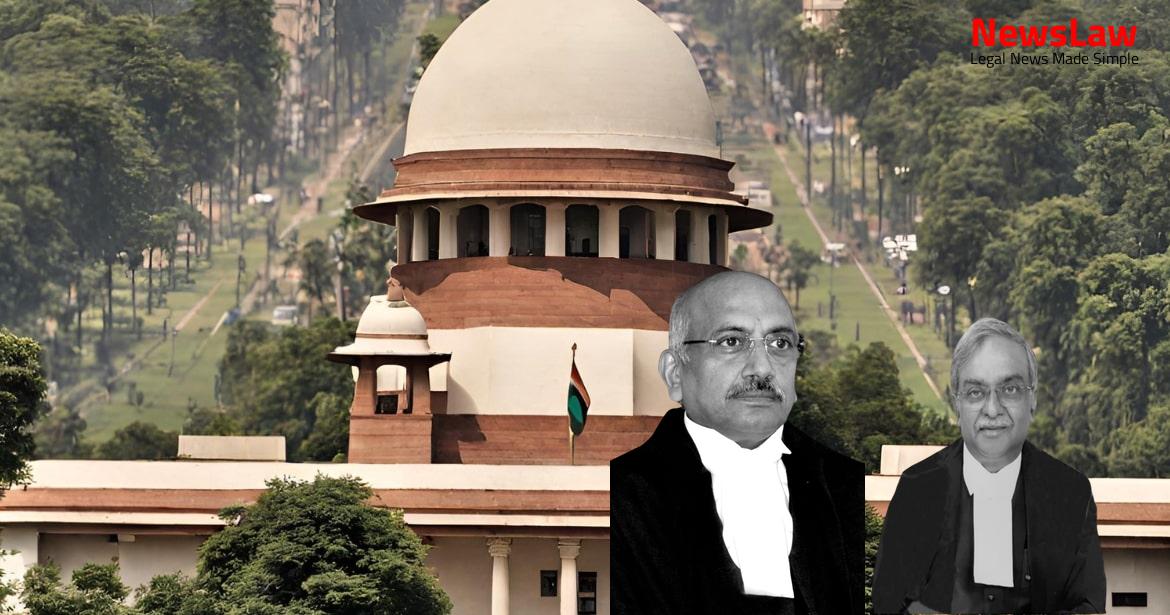In a recent legal development, the Supreme Court has overturned the High Court’s acquittal in a Cheque Bounce case, ruling in favor of the complainant. The case, involving dishonoured cheques and a dispute over payments for rice bags, has led to the conviction of the accused under Section 138 of the Negotiable Instruments Act. The judgment ensures that justice is served, setting a precedent for fair resolution in similar cases.
Facts
- Appellant filed two complaints under Section 138 of the Negotiable Instruments Act against the respondent-accused for dishonoured cheques.
- Despite legal notices, respondent did not make payments for the dishonoured cheques.
- In case No.339/OA/NI/2004/A, three cheques issued by the respondent were dishonoured.
- The High Court upheld the acquittal of the respondent-accused in Criminal Appeal Nos.53 and 54 of 2006.
- The appellant’s counsel argued that the transactions were mercantile with a mix of cash and cheque payments.
- Details of the dishonoured cheques issued by the respondent in case No.499/OA/NI/2004/A were presented.
- The trial court acquitted the respondent based on receipts provided.
- The High Court held that the complainant failed to explain in the complaint that cash payments made by the respondent were for other commodities and cheques were for rice bags.
- The trial court noted that the written complaint did not mention that the respondent made both credit and cash purchases.
- The trial court dismissed the appellant’s claim that the respondent used to purchase rice bags on credit and cash, deeming it inconsistent with the presented documents.
- The High Court upheld the acquittal, stating that the respondent used the cheques as security for goods supplied, which were subsequently paid in cash.
- The High Court found that the respondent’s production of receipts refuted the presumption, demonstrating that the cheques were security for goods paid in cash.
- The trial court mentioned that the respondent would leave blank cheques as security with the appellant for credit purchases, making Section 139 presumption unavailable to the appellant.
Also Read: High Court Acquittal Case of State of Uttar Pradesh v. Jai Prakash
Issue
- The issue at hand is whether the courts were correct in acquitting the appellant-complainant
- The key focus is on proving whether the respondent-accused owed a debt to the appellant-complainant
- It is essential to establish if the cheques were indeed issued for the purpose of settling the said debt
- The transaction between the parties was clearly a mercantile one involving supply of rice bags
Also Read: Judgment Review: Supreme Court’s Ruling on the Capital Punishment Appeal
Arguments
- The respondent used to leave cheques with the complainant when purchasing commodities.
- The respondent made cash payments towards the commodities and received receipts from the complainant.
- Despite receiving money for the rice bags, the complainant allegedly failed to return the cheques, leading to false complaints by the complainant against the respondent.
- The respondent presented twenty-six receipts and receipts colly as evidence, totaling Rs. 1,94,000, to demonstrate payment.
- The courts below ruled in favor of the respondent, concluding that the presumption under Section 139 of the Negotiable Instruments Act was successfully rebutted.
Also Read: Compromise Reached: Reddy Satyanarayana vs Narapureddy Sanyasi Rao
Analysis
- The complainant presented evidence that the cheques were issued for purchases made on credit.
- The father of the accused confirmed that they purchased rice bags from the complainant and left cheques with them.
- To dispute the statutory presumptions, the accused is not required to prove his defense beyond reasonable doubt as the complainant would in a criminal trial.
- The court noted the inconsistency in the dates of the cheques issued by the accused, suggesting they were already with the complainant before being utilized.
- Despite payments made by the accused for the purchases, the cheques were not returned by the complainant, which raises questions about their usage and validity.
- Both parties presented conflicting accounts regarding the nature of purchases, payments made, and the handling of blank cheques.
- It is crucial for the accused to provide evidence to demonstrate the absence of consideration and debt related to the disputable cheques.
- Section 139 of the Negotiable Instruments Act provides for a presumption that the holder of a bounced cheque received it for the discharge of a debt or liability.
- Presumptions are legal devices enabling courts to decide on an issue even in the absence of evidence.
- A presumption is not evidence in itself but creates a prima facie case for the party in whose favor it exists.
- The presumption under Section 139 of the Act is rebuttable, meaning it can be challenged by the accused.
- The accused in a cheque bounce case can rebut the presumption by showing that consideration or debt did not exist, or under the circumstances, it is highly unlikely that consideration or debt existed.
- Presumptions can be classified as ‘may presume’ (rebuttable), ‘shall presume’ (rebuttable), and ‘conclusive presumptions’ (irrebuttable).
- The defense of the respondent that the blank cheques were not returned by the complainant despite payment for commodities is considered unbelievable and unacceptable by the court.
- No sentence of imprisonment is imposed on the accused due to the cheque transaction being of the year 2003 and the lapse of time.
- The evidence presented by the accused is insufficient to rebut the presumption raised under Section 139 of the Negotiable Instruments Act.
- The High Court’s judgment is deemed unsustainable and is set aside.
- The respondent-accused is convicted under Section 138 of the Negotiable Instruments Act in both complaints.
Decision
- The High Court’s judgment in Criminal Appeal Nos. 53 and 54 of 2006 is set aside.
- The appeals are allowed upon depositing the fine amount of Rs.2,97,150/-.
- The fine amount shall be paid to the appellant-complainant.
- The respondent is convicted under Section 138 of the Negotiable Instruments Act.
- A fine of Rs.2,97,150/- is imposed on the respondent, consisting of Rs.53,171/-, Rs.1,93,979/-, and compensation of Rs.50,000/-.
- Failure to pay the fine will result in a six-month imprisonment for the respondent.
Case Title: M/S.SHREE DANESHWARI TRADERS Vs. SANJAY JAIN
Case Number: Crl.A. No.-000061-000062 / 2011



